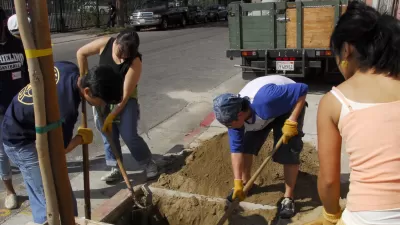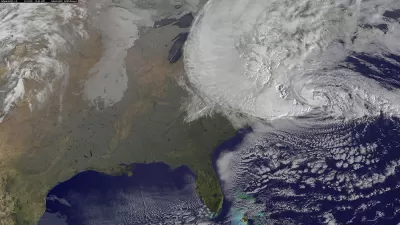Practicing sustainability can improve communities and the lives of those living there. One of the best ways to encourage sustainable living is through volunteering.

Volunteering is a satisfying and powerful way to improve the health and vitality of a growing city. However, the key to developing a sustainable community involves strategic planning and implementation and clear communication of goals.
Although sustainability initiatives bring essential environmental, economic, and social benefits, many activities are easier to put into practice with active participation from neighbors and local businesses. Here are five methods of building a more sustainable community with volunteers.
1. Build a Community Garden
A community garden is an excellent civic engagement initiative for volunteers of all ages to plant fruits, vegetables, and herbs.
In addition to being a great way for neighbors to bond and meet one another, community gardens have several environmental benefits, such as supporting pollinator colonies in cities, enhancing local food sources for low-income families, and reducing the urban heat island effect by absorbing carbon dioxide emissions.
Local schools may also encourage student participation in this project through education and community service.
2. Plant Trees
An effective way to build a sustainable community is for volunteers to plant trees. Urban trees can store as much carbon as tropical rainforests while mitigating soil erosion and serving as food and habitat for urban wildlife.
Unlike trees in rural areas and larger forested regions, urban trees are typically exposed to unique conditions. For example, trees in cities face higher levels of vehicle emissions and air pollution, soil contaminants, windspeeds, reduced access to irrigation and soil drainage, and greater contact with structures and power lines.
Volunteers can help by regularly watering and trimming trees to boost their survivability in urban spaces.
3. Host Cleanups
Neighborhood cleanup events are another way volunteers can build a sustainable community in their cities. You don't need a massive team to accomplish this, either—although it would be great if many people decided to get involved.
One of the benefits of community cleanups is that people of all ages can participate. Neighbors can gather to pick up trash on their block, or volunteers can host a cleanup event at a local park, riverbank, or beach.
Picking up trash removes litter and other harmful debris that threatens wildlife, improves groundwater quality, and protects local habitats.
4. Help Wildlife
Human-animal interactions become more prevalent as humans exploit the environment to develop cities. Although urban areas account for less than 10% of total land surface, the rate of urban sprawl has severe implications for local wildlife.
Community members who love animals can volunteer at wildlife rescue and rehabilitation centers. Whether they’re interested in hands-on animal care or administrative tasks, able and willing volunteers are typically welcome.
5. Create a Community Compost Bin
Along with community gardens, volunteers can build a city-wide compost system to reimagine waste as a vital resource.
The U.S. Department of Agriculture (USDA) estimates that 30 to 40 percent of the U.S. food supply is wasted annually. A composting program allows neighbors to bring their plant-based food waste to local bins for community gardens and other residential gardening projects.
Volunteers can collect organic waste during drop-off hours and maintain the bins. The many benefits of composting include promoting healthy soil, decreasing pesticides, improving water conservation, and enhancing stormwater management.
Strength in Numbers for Continued Progress
Retaining and boosting volunteers is essential for ongoing success. That’s why it’s crucial to find ways to improve the volunteer experience through education and training on green initiatives. Active participation in eco-friendly activities is instrumental in building a healthy and sustainable community.

Planetizen Federal Action Tracker
A weekly monitor of how Trump’s orders and actions are impacting planners and planning in America.

Congressman Proposes Bill to Rename DC Metro “Trump Train”
The Make Autorail Great Again Act would withhold federal funding to the system until the Washington Metropolitan Area Transit Authority (WMATA), rebrands as the Washington Metropolitan Authority for Greater Access (WMAGA).

The Simple Legislative Tool Transforming Vacant Downtowns
In California, Michigan and Georgia, an easy win is bringing dollars — and delight — back to city centers.

The States Losing Rural Delivery Rooms at an Alarming Pace
In some states, as few as 9% of rural hospitals still deliver babies. As a result, rising pre-term births, no adequate pre-term care and "harrowing" close calls are a growing reality.

The Small South Asian Republic Going all in on EVs
Thanks to one simple policy change less than five years ago, 65% of new cars in this Himalayan country are now electric.

DC Backpedals on Bike Lane Protection, Swaps Barriers for Paint
Citing aesthetic concerns, the city is removing the concrete barriers and flexposts that once separated Arizona Avenue cyclists from motor vehicles.
Urban Design for Planners 1: Software Tools
This six-course series explores essential urban design concepts using open source software and equips planners with the tools they need to participate fully in the urban design process.
Planning for Universal Design
Learn the tools for implementing Universal Design in planning regulations.
Smith Gee Studio
City of Charlotte
City of Camden Redevelopment Agency
City of Astoria
Transportation Research & Education Center (TREC) at Portland State University
US High Speed Rail Association
City of Camden Redevelopment Agency
Municipality of Princeton (NJ)






























